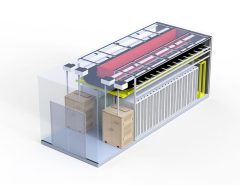Authors: Francisco J. R. Ruiz, Tuomas Laakkonen, Johannes Bausch, Matej Balog, Mohammadamin Barekatain, Francisco J. H. Heras, Alexander Novikov, Nathan Fitzpatrick, Bernardino Romera-Paredes, John van de Wetering, Alhussein Fawzi, Konstantinos Meichanetzidis, Pushmeet Kohli
Published on: February 22, 2024
Impact Score: 7.6
Arxiv code: Arxiv:2402.14396
Summary
- What is new: Development of AlphaTensor-Quantum, a deep reinforcement learning method that uniquely incorporates domain-specific quantum computation knowledge and leverages gadgets for T-count optimization.
- Why this is important: Optimizing the T-count (minimizing the number of T gates) in quantum circuits, which is a critical challenge for building fault-tolerant quantum computers.
- What the research proposes: The introduction of AlphaTensor-Quantum, a novel approach based on deep reinforcement learning for optimizing T-count by exploiting the relationship between T-count and tensor decomposition.
- Results: AlphaTensor-Quantum outperformed existing methods in T-count optimization across arithmetic benchmarks, found an efficient multiplication algorithm akin to Karatsuba’s for finite fields, and matched or outperformed best human-designed solutions for computations relevant to Shor’s algorithm and quantum chemistry simulation.
Technical Details
Technological frameworks used: Deep reinforcement learning
Models used: AlphaTensor-Quantum’s unique model incorporating domain knowledge and gadgets
Data used: Arithmetic benchmarks, and computations relevant to Shor’s algorithm and quantum chemistry simulation
Potential Impact
Quantum computing companies, cryptography, and quantum chemistry simulation markets could significantly benefit from these optimization techniques, potentially disrupting current computational approaches in these fields.
Want to implement this idea in a business?
We have generated a startup concept here: QOptiTech.


Leave a Reply